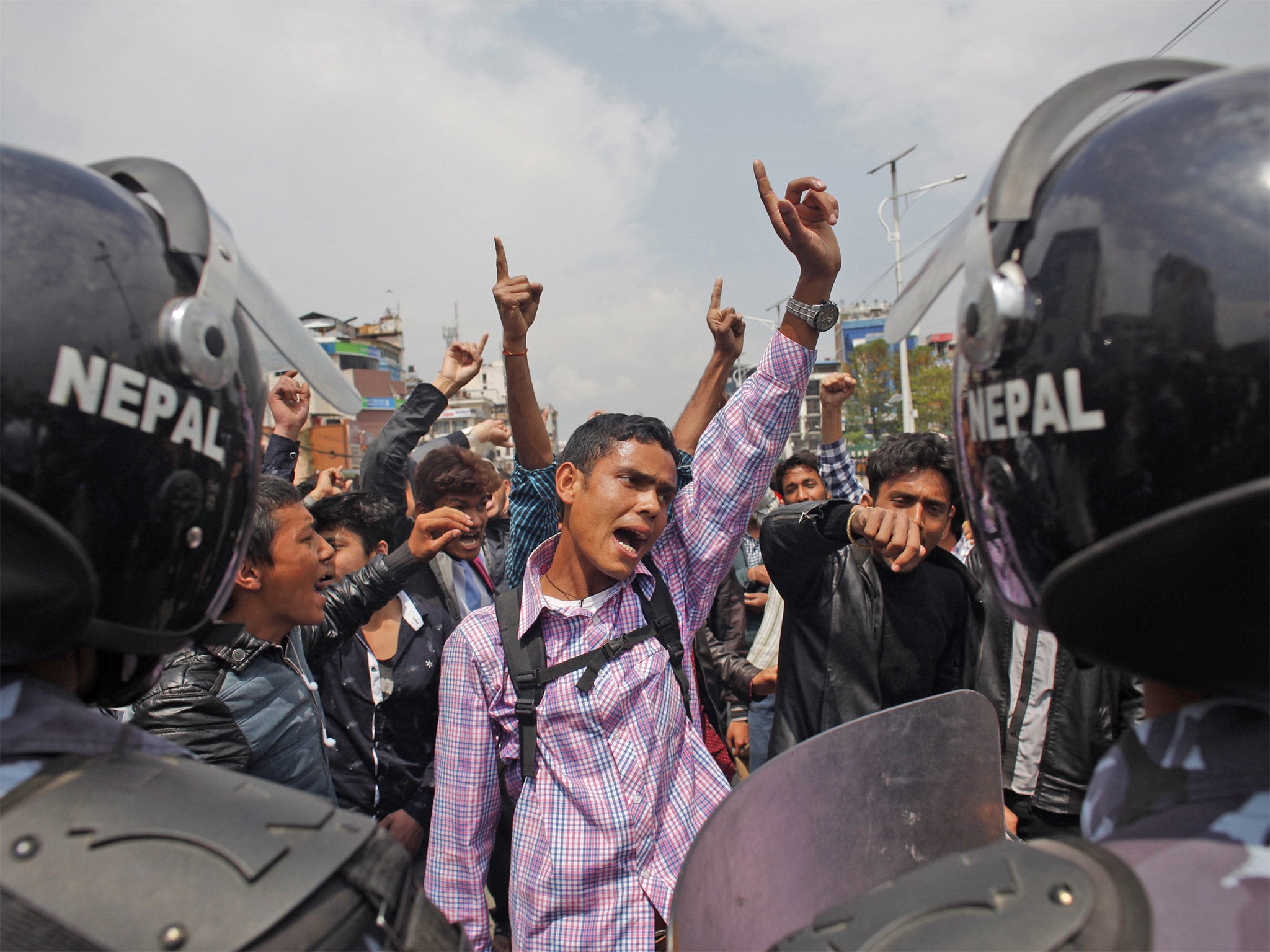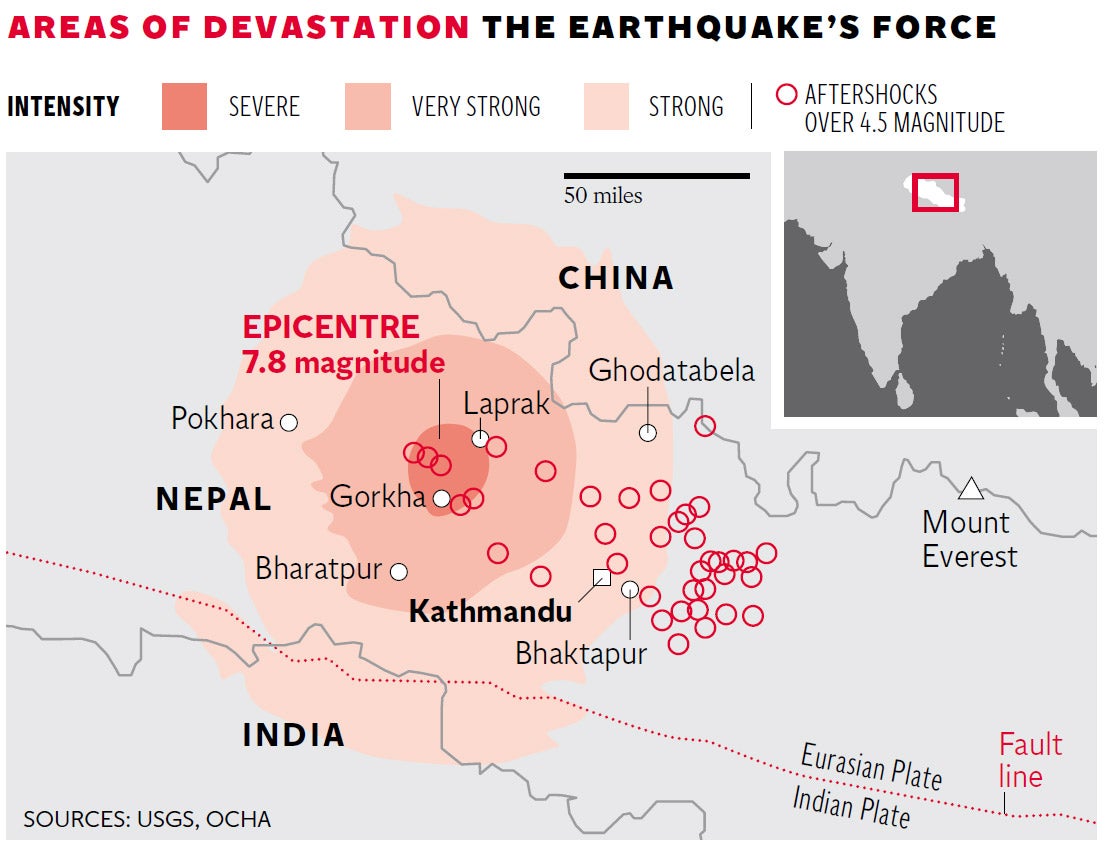Nepal earthquake: Crowds grow angry as emergency relief fails to reach them
The government has been struggling to assess the devastation wrought by Saturday’s 7.8 magnitude quake

Your support helps us to tell the story
From reproductive rights to climate change to Big Tech, The Independent is on the ground when the story is developing. Whether it's investigating the financials of Elon Musk's pro-Trump PAC or producing our latest documentary, 'The A Word', which shines a light on the American women fighting for reproductive rights, we know how important it is to parse out the facts from the messaging.
At such a critical moment in US history, we need reporters on the ground. Your donation allows us to keep sending journalists to speak to both sides of the story.
The Independent is trusted by Americans across the entire political spectrum. And unlike many other quality news outlets, we choose not to lock Americans out of our reporting and analysis with paywalls. We believe quality journalism should be available to everyone, paid for by those who can afford it.
Your support makes all the difference.Frustrations over the slow pace of aid delivery has erupted across Nepal with many people short of food and water and in desperate need of supplies.
In the capital Kathmandu, about 200 people demonstrated outside parliament calling for the government to speed up the distribution of aid that has flooded into the country but has not yet reached those in need after the earthquake, which has left more than 5,200 dead and upwards of 10,000 injured.
In Sangachowk village in one of the worst-hit districts, about three hours by road from the capital, scores of angry villagers blocked the road with tyres. They stopped two trucks heading for the district capital with rice, noodles and biscuits. Later they blocked a convoy of three army trucks with relief supplies, leading to a tense stand-off with armed soldiers.
“We have been given no food by the government,” said Udhav Giri, 34. “Trucks carrying rice go past and don’t stop. The district headquarters is getting all the food.”
The Foreign Office confirmed that a British national, who had lived in Hong Kong, died in the quake, while they were also “urgently” looking into reports that another British national had been killed at Everest Base Camp, although there was no confirmation last night. The death toll at the camp has risen to 19, according to the Nepal Mountaineering Association. The total included 14 Nepalese sherpas, two Americans, and one person each from China, Australia and Japan, it said.
The government has been struggling to assess the devastation wrought by Saturday’s 7.8 magnitude quake. “This is a disaster on an unprecedented scale. There have been some weaknesses in managing the relief operation,” Nepal’s Communication Minister Minendra Rijal said late on Tuesday. In some mountainous areas, the government has struggled to deliver aid. Shambhu Khatri, a technician on board one of the helicopters, said hillsides had collapsed in parts of the Gorkha district, burying settlements, and access was almost impossible. The United Nations has launched a $415m (£270m) appeal, saying relief efforts must be scaled up. It said the money would be used to provide 500,000 people with shelter such as a tent or tarpaulin sheets, 1.4 million people with food, and 4.2 million with safe drinking water and toilets.

In Kathmandu and other cities, hospitals quickly overflowed with the injured soon after the quake. Guna Raj, who works for a Kathmandu-based NGO specialising in providing sanitation, said there have been outbreaks of diarrhoea in relief camps because of a shortage of toilets and clean water.
Fears about disease and conditions have sparked an exodus from Kathmandu. Thousands tried to take advantage of free bus travel provided by the government, leading to scuffles as people tried to board vehicles that would take them back to their homes in rural communities.
A UK flight with around 120 British nationals onboard took off from Kathmandu last night, and is expected to arrive this morning. Members of the Israeli search-and-rescue group Magnus said hundreds of tourists, including about 100 Israelis, were airlifted out of Langtang in Rasuwa district, but fights had broken out there because of food shortages, a Magnus team member, Amit Rubin, said.
Reuters
Join our commenting forum
Join thought-provoking conversations, follow other Independent readers and see their replies
Comments